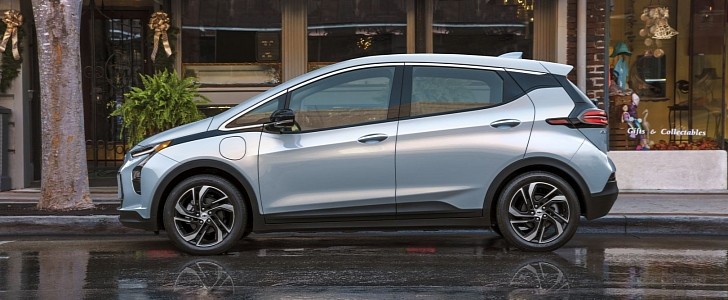Chevrolet Bolt has been a disaster for GM, there’s no question about it. The company has tried its best to dodge Bolt’s problems before finally deciding to take the right decision and replace the Li-Ion batteries on all the vehicles it sold. Even as Chevrolet is trying to put all this behind and start fresh with the Bolt, a new class-action lawsuit is boiling north of the border.
Chevy Bolt will probably be entitled to a place in the textbook on how not to handle corporate blunders. After the first fires were documented, the company tried to downplay the situation and offered inadequate solutions like a software update to limit battery capacity. GM later advised owners not to park the Bolt in garages or near other vehicles. It wasn’t until the first class-action lawsuits that GM decided to do the right thing and recall the Bolt to replace its batteries.
It was a huge blow for GM’s ambitions as an EV powerhouse, but its partner LG Chem took the greatest hit as it had to pay for the replacement batteries. Even so, both GM and LG swallowed and moved on, even restarting Bolt production earlier this month. It looks like the drama is not over yet, at least for GM, as the American company was hit with another class-action lawsuit in Canada.
A Canadian owner of two Chevrolet Bolt EVs has filed suit against GM alleging the company knew about the Bolts battery defects. According to carcomplaints.com, the case was filed in the Supreme Court of British Columbia. The plaintiff, who owned two Bolts, one built in 2017 and one in 2018, alleges that Bolt’s batteries cause the electric cars to catch fire. Moreover, GM was deceptive in marketing the Bolt, which has caused Canadian customers to drive dangerous cars.
“GM and GM Canada have been aware of issues affecting the batteries in the Class Vehicles since at least 2018,” says the plaintiff. “Nonetheless, GM and GM Canada have marketed and sold Chevrolet Bolts with the knowledge that they contain defective and potentially dangerous batteries without warning customers or authorized dealerships of the issue.”
The plaintiff also alleges General Motors repurchased Chevy Bolts in several areas of the U.S. but never made the same offer to Canadian customers. Not sure what are the chances that the judge would rule in his favor, but this sure might brighten the day for a lot of Canadian Bolt owners who brought a 2017-2022 Chevy Bolt or Bolt EUV.
It was a huge blow for GM’s ambitions as an EV powerhouse, but its partner LG Chem took the greatest hit as it had to pay for the replacement batteries. Even so, both GM and LG swallowed and moved on, even restarting Bolt production earlier this month. It looks like the drama is not over yet, at least for GM, as the American company was hit with another class-action lawsuit in Canada.
A Canadian owner of two Chevrolet Bolt EVs has filed suit against GM alleging the company knew about the Bolts battery defects. According to carcomplaints.com, the case was filed in the Supreme Court of British Columbia. The plaintiff, who owned two Bolts, one built in 2017 and one in 2018, alleges that Bolt’s batteries cause the electric cars to catch fire. Moreover, GM was deceptive in marketing the Bolt, which has caused Canadian customers to drive dangerous cars.
“GM and GM Canada have been aware of issues affecting the batteries in the Class Vehicles since at least 2018,” says the plaintiff. “Nonetheless, GM and GM Canada have marketed and sold Chevrolet Bolts with the knowledge that they contain defective and potentially dangerous batteries without warning customers or authorized dealerships of the issue.”
The plaintiff also alleges General Motors repurchased Chevy Bolts in several areas of the U.S. but never made the same offer to Canadian customers. Not sure what are the chances that the judge would rule in his favor, but this sure might brighten the day for a lot of Canadian Bolt owners who brought a 2017-2022 Chevy Bolt or Bolt EUV.






